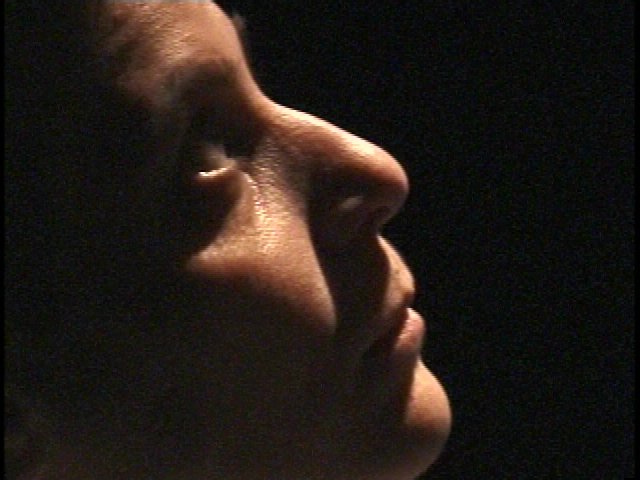Helene Cixous: Savoir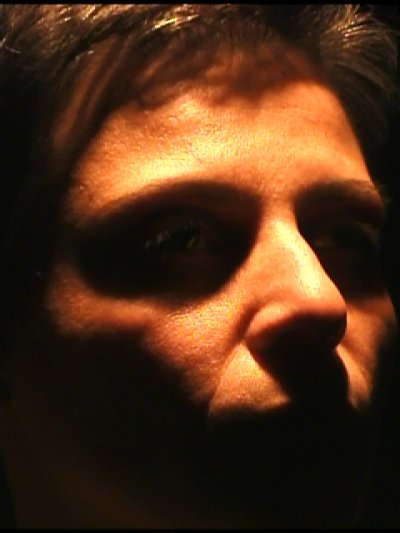
Savoir: to know
Voir: to see
Voile: Veil

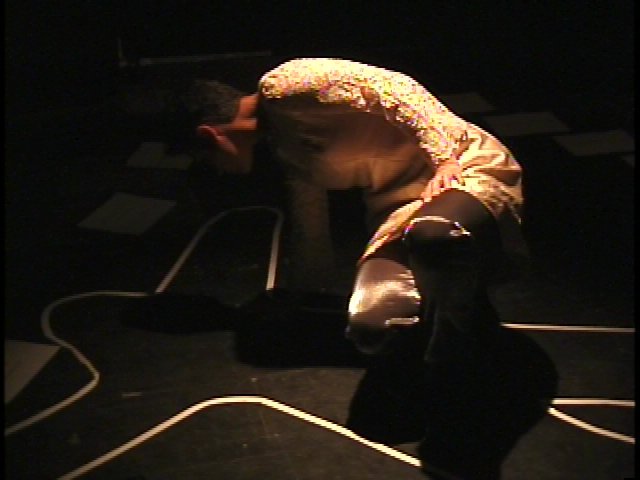
Body Provisional
A sharing about pain and presence, bodily fantasies and internal resources, medical visions and surveillance.
Devised by Petra Kuppers and Sophia Lycouris. With texts by Petra Kuppers, Aparna Paul, Kari Ogidan, Jason Rubin Sugarman, Katie Walsh, Chris Wilson
------ Providence, RI, 2002
------ NYC, April 2002
Created with support from the Bryant College Women's Center and by a research grant from Nottingham Trent University
Performance Scripts (Petra Kuppers)
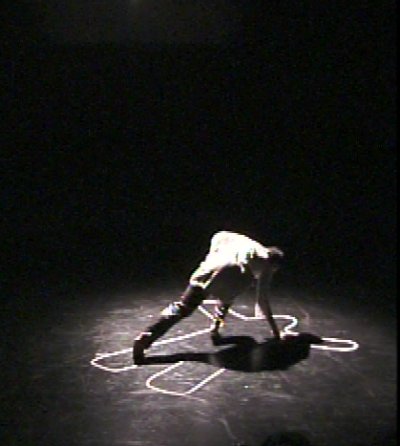
|
Helen's Eyes Helen Helen Can you see me? Can you hear me? She's gone back to sleep, I think. She was just waking up, a little bit, early waking, and it was probably really easy to just go back again. And she has time to think it over, to decide whether she wants to be awake or not. You know, Helen is near-sighted. She had been born with a veil in her eye. A veil. Like thin or thick, velvet or satin, silk maybe. Or cotton on a summer's day. A nice veil. How do you imagine it? A whitish bridal veil moving in the liquids of her eye? Or a piece of strong cloth, pulling her eyeball out of shape, stressing the squinting eye? I don't know. Sometimes, in the mornings when I try to catch her eye, I think of Helen's veil like a plushy velvet. You know, a museum velvet, wrapping up the glass globe, keeping it nice and safe, but keeping me out. Without her glasses, Helen is wrapped tightly into the folds of
her self. She can't see clearly. So in the mornings, nothing in
her room, in her bed, reaches out and grabs her. And then, you know, early in the morning as sleep leaves us, the veil becomes that modesty curtain that people used to hang up between the two sides of a bed, his n' hers. Or even the grand tapestries of old medieval beds, that kept out drafts, and kept in the mysterious of procreation. She is all on her own, Helen is. Her fuzzy world held at bay. Maybe right now, Helen is thinking about the shapes outside. She wonders about distance. About shape. About depth and weight of that cloud of a world, out there, beyond the clarity of her mind. She's sharp, you know, and her eye behind her glass can just pierce me. But now, there's just that glass curtain between us. If eyes are the windows to the soul, do eyes that don't see let me peep in? I can never get her to move in the mornings. Helen Helen I don't think she wants to hear me right now. You know, Helen has
had an operation. Her eyes lost their veil. I imagine her flinching as my face, so near to her own, touches her eyeball. In the morning, she blinks as if she caught an eyelash in her eye: black, and long, and velvet. She has no choice. She wakes up to me. To my face. To the lines of my hand, the shape of my cuticle. Helen She is looking away from me. I think I can see her on her bed there.
Her hands move. Her hands pleat black ribbons with tiny satin arrows
on them. I think she is mourning. I wish she would see me. |
Maria's Back
Maria wakes up. Her back hurts. She is lying in her warm bed. There is a crease on her face from the pillow, but Maria cannot see it. She is in her back. She is curling around her wounded spine, her gently aching twig, her sweet reed. She longs to launch the dry rod of her spine in the waters of Nile, in the ocean swells off Westerly. Her spine a column of stone a strong iron girder Her spine are milk blocks ascending intricate pleatings of calcium
Ghost Haunting Phantom Pain
Cloud of bird electrons
Tendrils weaving into knots and searing paths. Water too hot, too cold She opens her eyes. She is thirsty. There is a glass on the nightstand,
just there. But her back is baked into place. She is held tight,
tucked in like Gulliver by strands of nerves sown deep into the
bedlinen. She holds herself tight. She is held tight. Maria is thirsty.
Her arm won't move.
|
|
|
Maria touches the peddles of pain in her back Marble Placeholders Marking the place no-place of granular ache
She breathes, and rinses the precious calcids Panning for gold at the bottom of her body
Maria stacks her bones carefully, gently, so deliberate Taking precious support from kidney, lungs, her throat and the tight sack of skin
|
(Helene Cixous about her nearsightedness)
She had been born with the veil in her eye.
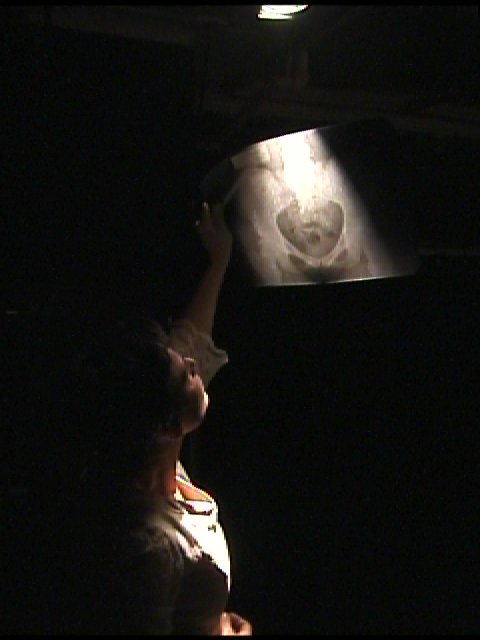
(After the Myopia Operation)
But if myopia could be expelled, was it then a foreigner? She had always had the presentiment that her myopia was her own foreigner, her essential foreignness, her own accidental necessary weakness. Her fate. And she had left her fate behind with a leap? Left her skin. Her eyelid in which her soul was lying sewn. (10)
But while her unbound soul soared, a fall formed: getting away from her 'my-myopia,' she was discovering the bizarre benefits her internal foreigner used to heap on her 'before', that she had never been able to enjoy with joy, but only in anguish: the non-arrival of the visible at dawn, the passage through not-seeing, always there has been a threshold, swim across across the strait between the blind continent and the seeing continent, between two worlds, a step taken, come from outside, another step, an imperfection, she opened her eyes and saw the not yet, there was this door to open to get into the visible world. (12)
Process- some notes
This Cixous text is about the curious splitting/changing of self after an impairment, a bodily thing (myopia) is operated away. Cixous mourns her near-sightedness, and the form of self-knowledge and visibility of knowledge that it brought with it.
I am interested in how medical fantasies work on our fantasies of our bodies, and our epistemological, 'knowledge-making' facilities.
Is physical pain a 'border' that sheds light on movement processes the way a 'normal' body can't? Is it, like her nearsightedness for Cixous, a veil between her self and her public self, her-self-in-the-world?
Does the architecture of the body change as it becomes more tangible/visible/present through the the life-changes of the body and their effects of mobility, nerves and range, the medical images of it, and our hermeutics of these images? Cixous only becomes aware of the own knowledge processes after her myopia is (nearly) over, after an operation has changed the structure of her eye. Does aging have similar effects on your perception of your body and its being in space? For Cixous here, her myopia had a distinct distancing effect between the spaces surrounding her and her own body-word. After the operation, the world rushes in - too much for her. Does age and body architecture work in the same way, with mourning allowing for a retrospective witnessing of the body mobility?
